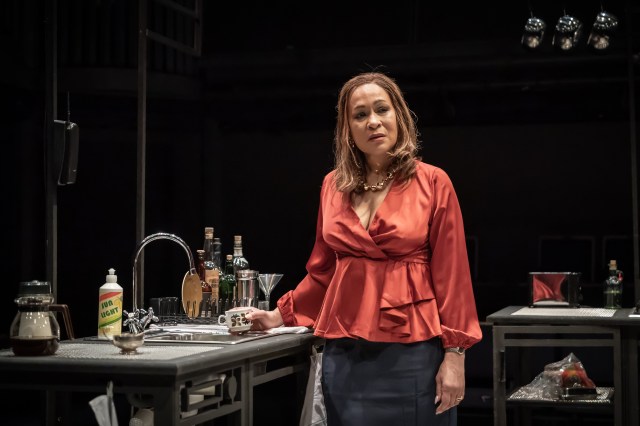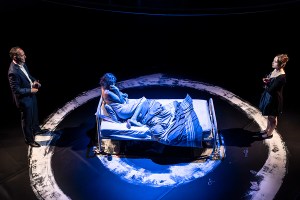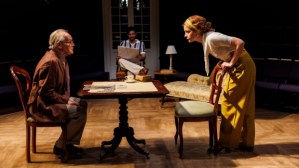Meetings at the Orange Tree Theatre – review
The production, marking Kalungi Ssebandeke’s directorial debut, runs until 11 November

The kitchen onstage at the Orange Tree Theatre might be smaller than the one A Little Life had recently – its sink may not work – and it certainly sees less complicated cooking. But there’s a real point to it. In Meetings, the theoretical nature of Hugh and Jean’s neglected kitchen all at once becomes urgent for Hugh, who begins to uncontrollably crave the food from his childhood.
The providential arrival of a young cook, Elsa, transforms the kitchen with utility, disturbing the high-powered business couple’s fast, rather callous lives. Mustapha Matura’s 1981 play is revived at the Orange Tree in Kalungi Ssebandeke’s production, winner of the 2023 JMK Award (set up in memory of young director James Menzies-Kitchen), which is the actor and writer’s directorial debut.
In designer Olivia Jamieson’s skeleton of a plush, neglected kitchen, disarmingly simple contrasts – where you live, what you eat, and how you afford that – slowly gain density and implication. Ssebandeke is a great match for the fondness and comedy in Matura’s satire, which is no less earnest than irreverent: the couple are each anatomically involved in Trinidad’s burgeoning fortunes via the projects they oversee, from its water systems to its people’s lungs. It’s how they pay for their pool, and their pristine countertops.
As Hugh, Kevin N Golding (who starred in previous Matura production at the Orange Tree, Play Mas) finds that solemnity and playfulness which certain older men possess that reminds you of young boys. He’s quick and sharp, clearly a man of voracious general appetite even before he starts talking about saltfish and coo-coo, dumplings and cassava bread: he seems to levitate across the stage like a cartoon wolf smelling an apple pie on a windowsill. Once begun, his reckoning with both who and where he now is, financially and culturally, is a sick slide that can’t be stopped.
His equal is Martina Laird’s Jean, seemingly wise and glamorous at first, sometimes lascivious, glinting with obvious edge, and impossible not to love. Laird wraps her lips around her martini glass after pointing out Elsa’s lack of a dressing gown in their house as eloquently as she comes to show us Jean twisting herself up in knots to get away from a proper look at herself. She’s the scene-stealer even though all three actors are marvellous. Despite playing a part that remains more mysterious to us than the couple, Bethan Mary-James’ frank, refreshing Elsa feels fittingly as though she’s walked in from another world altogether.
There isn’t a hugely prevailing sense of Ssebandeke’s stamp on the play: Hugh and Elsa share a visual imagination of which Jean is deprived, imagining food – and eventually moments of transcendence – away from themselves, physically turning outwards. Ssebandeke literalises this in their use of the space of Jamieson’s set, stepping out of its bounds, but it happens without much of a shudder. Transitions feel a little nondescript and guessed at, with slow-motion utilised to vague effect.
Grasping towards stranger moments, sometimes the deployment of Jose Puello’s sound design of soft extended notes and occasional drum beats as well as Ali Hunter’s lighting, closing in on Jean onstage or bringing colour for ritual, leaves a slightly aimless or overemphatic impression. Perhaps some of the more potent, ambiguous depictions of Orisha, and later moments of considerable devastation, are writ larger and less delicately than they could be. They’re minor objections: the cast and the chance to catch this funny, slippery play make together an undeniable gift, as Matura deserves.
















